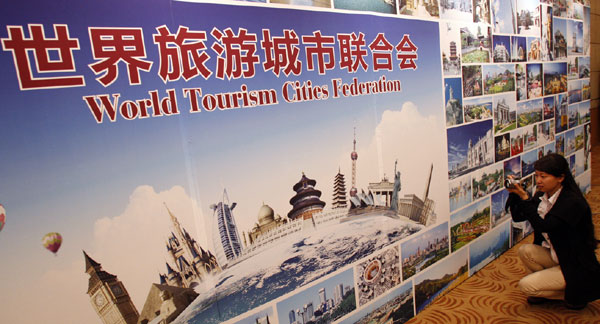| Home > Living In China |
A more travel-friendly globe awaits Chinese
After two decades of vacationing around the world, avid traveler Meng Hairong has become well-versed in the art of body language.
Fluent in only her native Mandarin, the 56-year-old retiree has often faced problems communicating with locals in overseas destinations.
"It's comparatively easier for foreign people to travel abroad since there are introductions at scenic spots in most tourism cities in English, French and Spanish," she said. "It hardly works out for Chinese, though."
To avoid the hassle, Meng, who lives in Tianjin, travels with Chinese tourist agencies. Yet even that is not easy.
"You hop off a tourist bus to take pictures or use the washroom and then hop back on for the next destination, over and over again. That is not my idea of traveling," she said.
Despite enjoying the fascinating scenery, many Chinese tourists like Meng find themselves lost while traveling abroad due to the lack of service designated for Chinese tourists. However, that may not be the case much longer.
Lu Yong, leader of the preparatory team of the World Tourism Cities Federation, said services designated for Chinese travelers may be provided, and improved, in major world tourism cities.
Such services could include food and accommodation, road signs and emergency treatment, Lu said at the launch of the federation by Beijing and like-minded cities.
According to Li Xinjian, a tourism professor at the Beijing International Studies University, since outbound tourism has just developed in recent decades in China, not many tourist destinations are well-equipped with services for Chinese, compared with tourists from other countries.
However, with the number of Chinese outbound tourists skyrocketing, many countries have started eyeing the huge potential market.
According to the preparatory team of the federation, many tourism cities worldwide might be equipped with signs and introductions in Chinese in the near future.
"As the purchasing power of Chinese tourists continues growing, no one wants to ignore such a big piece of the pie," said Lu.
The Chinese have become a major buying power in foreign markets in recent years, according to Li.
"Foreigners traveling to China spent 4.7 billion yuan ($743 million) more than Chinese outbound tourists in 2008. However, we spent 4 billion yuan more than them one year later," he said.
That difference exceeded 24.1 billion yuan in 2011, he added. Li said the growing purchasing power of Chinese tourists is very likely to lead to other conveniences as well, including easier visa applications, more frequent flights and the establishment of more direct routes between Chinese and foreign cities.
Previously, due to concerns about illegal immigration, many countries carried out strict and complicated verification for Chinese tourists.
However, Li said that since hardly any cases of illegal immigration are related to outbound tourism, many countries are creating more incentives to attract Chinese tourists.
During the recent economic recession, for example, the US government relaxed its limits for visas for Chinese tourists.
The Japanese government has also been communicating with some western cities in China, while offering more convenience in travel, to attract more Chinese tourists and help its economy recover after the earthquake.
Helmuts Kols, a representative of Riga, the capital of Latvia, was looking forward to seeing more tourists from China, which might encourage the scheduling of direct flights between Beijing and Riga.
"That would be convenient for tourists from both countries," he said.
According to Zhang Hui, a professor of the tourism industry from Beijing Jiaotong University, in addition to the economic function of the tourism industry, the soft power of China and its city images can also get a boost through worldwide communication.
 |
|
A woman takes a photo of the poster of the World Tourism City Federation at the news conference of the federation in Beijing on Thursday. |
Custom
 more
moreWeb Dictionary
Primary&secondary
Beijing National Day School
Beijing Concord College of Sino-Canada
Brief Introduction of BCCSC Established in the year 1993, Huijia School is a K-12 boarding priva...Beijing Huijia Private School





 print
print  email
email  Favorite
Favorite  Transtlate
Transtlate 







